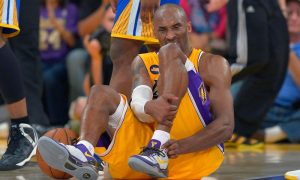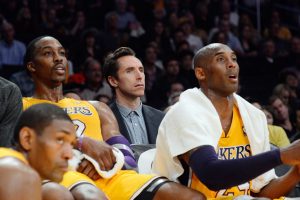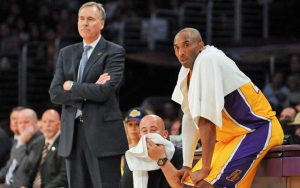We will forever remember Kobe Bryant‘s farewell season, getting honored by every NBA team, every fanbase saying their goodbyes to the legend. His final game was something special.
Kobe went out with a legendary 60 points performance that capped off his iconic NBA career. But that day was more than the 48 minutes of game time. It was a day to reminisce about the glory days, giving roses to the legend while he was still here. For the fans, it was their last chance to see Kobe Bryant the competitor, the basketball player.
Kobe gave everyone one last reminder that he in fact was the Black Mamba. Hardly able to stand, he scored 15 points without missing a shot in the last three minutes of the game, and drained the game-winner. It was a true throwback to the glory days. It was the perfect ending to Kobe’s career.
But the unfortunate truth is while Kobe’s career continued, the Black Mamba’s playing career ended well before that 60 point night against Utah.
I don’t want that to come off as disrespect for what he did in the final years, rehabbing, dedicating countless hours in the gym and away from his family. It all counts and I would rewatch every game form those down times. However Kobe was all about winning championships. After his torn Achilles in 2013, we lost prime Black Mamba and any chance of seeing him win his 6th ring.
So let’s turn back the clock to the 2012-2013 season, and remember how at age 34, Kobe flipped the switch to Black Mamba and carried the Lakers to the playoffs.
1st Half of the 2012-13 Season
Coming into a 2012-13 regular season, Lakers’ fans had a lot to be excited about. In the offseason the Lakers acquired Dwight Howard in a 4-team trade, and picked up Steve Nash in a separate trade. Oh and Mike D’Antoni was the new coach. He plays an important role later in this story.
With the additions of Nash and Howard, combined with Kobe Bryant, Pau Gasol, and Metta World Peace, the Lakers looked like a title contender on paper. The narrative around the league was we could finally see a Kobe-LeBron Finals matchup.
But that wouldn’t play out.
Due to the old age roster, constant injuries, and chemistry issues, the Lakers closed out the first half of the season outside of the playoff picture. It was at the All-Star break that Kobe made it his mission to will the Lakers to the playoffs, with or out his teammates help.
It’s not a question of if we will make the playoffs. We will and when we get there, I have no fear of anyone. OKC, San Antonio, Denver, whoever. I have zero nervousness about that.”- Kobe Bryant
Kobe Puts the Team on His Back, Or Should I Say His Achilles

Coming back after the All-Star break, a 34-year-old Kobe went on an absolute tear. Throughout 24 games, Kobe led the Lakers to a 17-7 record while averaging 28.3 points, 6.1 rebounds, and 7.2 assists per game with a TS% of 58% in 39 minutes per game. That is a heavy workload for anyone, but even more so for a 34 year old, who plays with constant intensity.
But even then, there was more for Kobe to do. The Lakers were not yet in the playoffs and the season was ending down. So Kobe turned it up another notch.
In the final 7 games of the season, Kobe carried the Lakers to a 6-1 record while playing 45.5 minutes per game. He averaged 29 PPG, 7.3 RPG, and 8.4 APG. Not impressive enough for you?
Kobe played every second in 4 of the games, including a stretch of 3 games in 4 nights. Players today load manage in those situations.
However the strain of playing all those minutes, doing everything in his power to will the team to victory, would come back and hurt Kobe in a career altering way.
In the 45th minute spent on the floor against the Golden State Warriors, Kobe made a move that tore his achilles. What people forget about that game was the cumulative close calls and falls Kobe took leading up to the final blow. Watch the highlights, amid the jump-shots falling and lockdown defense, Kobe was on the floor often in that fourth quarter, grimacing often.
Despite having a torn achilles, and knowing his season was over, Kobe stepped to the free throw line and knocked down both shots, because the team still needed him.
After sinking the shots, Kobe was helped off the court and into the locker room. This is where one of the most heart breaking post game press conferences ensued. Kobe took questions about his injury, if and when he will return, and about the Lakers chances without him, all while he had tears in his eyes.
Circling back to the quote where Kobe said he would get the team to the playoffs. Well he succeeded as the Lakers snagged a playoff spot, but had no chance to beat the Spurs without him. The Lakers were eliminated in round 1 and the Lakers roster never looked the same.
Blame D’Antoni?
Remember I mentioned Mike D’Antoni? There was a lot of controversy surrounding D’Antoni about the number of minutes he played Kobe down the stretch. Beyond the minutes he allowed Kobe to compile, it was the workload he asked Kobe to shoulder. Kobe had to be the number one scoring option, number one playmaker, and often a lockdown defender. Combine that with playing every minute, Kobe’s 34-year-old body was destined to fall apart.
Kobe was going to play every minute if he had to in order to get the team to the playoffs. But he had tunnel vision and wasn’t thinking long term. Every player dedicated to winning has that mentality. As the head coach, it was D’Antoni’s responsibility to pull Kobe back at times, getting him rest when possible.
But then again reports and actual video evidence showed Kobe refusing D’Antoni’s request to take him out the game. Still that becomes another strike against D’Antoni because he didn’t garner respect or the courage of his best player. Or maybe D’Antoni knew the team couldn’t win with Kobe taking a rest, and looked out for himself.
Closing Thoughts:
We could blame D’Antoni, Steve Nash’s inability to stay healthy, Dwight Howard’s lack of consistency. But rather than look back on the season with envy, like I did for a long time, look back on it with appreciation. Appreciate what Kobe did for a team with no real chance at winning it all. He literally gave his body, years off his career, just for the team to make the playoffs. It was also the last time we got to see a prime Kobe Bryant in action. So while it ended miserably, we should still celebrate his greatness and determination in the 2012-13 season.
In Case You Missed It:
The Nightmare We Can’t Wake Up From: Kobe Bryant Is Dead At The Age Of 41.

